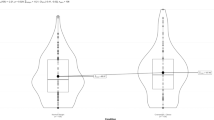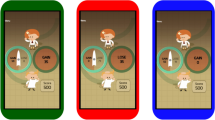Abstract
Background and objectives
Previous studies have documented that high rates of delay discounting are associated with obesity. However, studies utilizing monetary reward experiments typically report no associations, as opposed to positive associations apparent in studies utilising food-reward experiments. Our objective was to investigate the reasons behind the mixed evidence from a methodological perspective using systematic review and meta-analytic methodologies.
Methods
Seven databases (EMBASE, MEDLINE, PsycINFO, Scopus, Web of Science, Econlit and IBSS) were systematically searched. Logistic meta-regression was applied to identify the determinants of a significant association and risk of bias was assessed using a modified form of the Newcastle Ottawa cohort scale.
Results
A total of 59 studies were identified, among which 29 studies (49.2%) found a significant positive association and 29 (49.2%) reported no association. A higher proportion of significant and positive associations was reported in those studies utilizing ‘best-practice’ methods (i.e. appropriate measurement models) to estimate monetary delay discounting (15/27; 55.6%) and incentive-compatible experiments (10/16; 62.5%) than those using non-‘best-practice’ methods (14/34; 41.2%) and hypothetical experiments (19/43; 44.2%). All five studies utilizing both ‘best-practice’ methods and incentive-compatible experiments generated a positive and significant relationship. Results from a logistic meta-regression also suggested that studies employing incentive-compatible experiments (OR: 4.38, 95% CI = 1.05–18.33, p value: 0.04), ‘best-practice’ methods (OR: 4.40, 95% CI = 0.88–22.99, p value: 0.07), parametric methods (OR: 3.36, 95% CI = 0.83–13.57, p value: 0.04), those conducted in children/adolescent populations (OR: 3.90, 95% CI = 0.85–17.88, p value: 0.08), and those with larger sample size (OR: 1.91, 95% CI = 1.15–3.18, p value: 0.01) tended to show positive and significant associations between delay discounting and obesity.
Conclusions
This review suggests that the mixed evidence to date is a result of methodological heterogeneity, and that future studies should utilise ‘best practice’ methods.
This is a preview of subscription content, access via your institution
Access options
Subscribe to this journal
Receive 12 print issues and online access
$259.00 per year
only $21.58 per issue
Buy this article
- Purchase on Springer Link
- Instant access to full article PDF
Prices may be subject to local taxes which are calculated during checkout

Similar content being viewed by others
References
Forouzanfar MH, Alexander L, Anderson HR, Bachman VF, Biryukov S, Brauer M, et al. Global, regional, and national comparative risk assessment of 79 behavioural, environmental and occupational, and metabolic risks or clusters of risks in 188 countries, 1990–2013: a systematic analysis for the Global Burden of Disease Study 2013. Lancet. 2015;386:2287–323.
Ulijaszek SJ, McLennan AK. Framing obesity in UK policy from the Blair years, 1997–2015: the persistence of individualistic approaches despite overwhelming evidence of societal and economic factors, and the need for collective responsibility. Obes Rev. 2016;17:397–411.
Flegal KM, Kruszon-Moran D, Carroll MD, Fryar CD, Ogden CL. Trends in obesity among adults in the united states, 2005 to 2014. JAMA. 2016;315:2284–91.
Wang Y, McPherson K, Marsh T, Gortmaker SL, Brown M. Obesity 2 Health and economic burden of the projected obesity trends in the USA and the UK. Lancet. 2011;378:815–25.
Dombrowski SU, Knittle K, Avenell A, Araujo-Soares V, Sniehotta FF. Long term maintenance of weight loss with non-surgical interventions in obese adults: Systematic review and meta-analyses of randomised controlled trials. Bmj-Brit Med J. 2014;348:g2646.
Davies S. Annual report of the chief medical officer, 2014 - The health of the 51%: women 2015. https://www.gov.uk/government/publications/chief-medical-officer-annual-report-2014-womens-health. Accessed 07 March 2018.
Loewenstein G, Asch DA, Friedman JY, Melichar LA, Volpp KG. Can behavioural economics make us healthier? Brit Med J. 2012;344:e3482.
Obama B. Executive order - using behavioral science insights to better serve the American people 2015. https://obamawhitehouse.archives.gov/the-press-office/2015/09/15/executive-order-using-behavioral-science-insights-better-serve-american. Accessed 07 March 2018.
Mantzari E, Vogt F, Shemilt I, Wei YH, Higgins JPT, Marteau TM. Personal financial incentives for changing habitual health-related behaviors: a systematic review and meta-analysis. Prev Med. 2015;75:75–85.
Adams J, Giles EL, McColl E, Sniehotta FF. Carrots, sticks and health behaviours: a framework for documenting the complexity of financial incentive interventions to change health behaviours. Health Psychol Rev. 2014;8:286–95.
Lawless L, Andreas CD, Nayga Jr RM. Time preferences and health behaviour: a review. Agric Food Econ. 2013;1:17.
Reynolds B. A review of delay-discounting research with humans: relations to drug use and gambling. Behav Pharmacol. 2006;17:651–67.
Barlow P, Mckee M, Reeves A, Galea G, Stuckler D. Time-discounting and tobacco smoking: A systematic review and network analysis. Int J Epidemiol. 2017;46:860–9.
Barlow P, Reeves A, McKee M, Galea G, Stuckler D. Unhealthy diets, obesity and time discounting: a systematic literature review and network analysis. Obes Rev. 2016;17:810–9.
Story GW, Vlaev I, Seymour B, Darzi A, Dolan RJ. Does temporal discounting explain unhealthy behavior? A systematic review and reinforcement learning perspective. Front Behav Neurosci. 2014;8:76.
Mazur JE. Tests of an equivalence rule for fixed and variable reinforcer delays. J Exp Psychol Anim B. 1984;10:426–36.
Price M, Higgs S, Maw J, Lee M. A dual-process approach to exploring the role of delay discounting in obesity. Physiol Behav. 2016;162:46–51.
Andersen S, Harrison GW, Lau MI, Rutstrom EE. Discounting behavior: a reconsideration. Eur Econ Rev. 2014;71:15–33.
Wooldridge JM. Introductory econometrics: A modern approach.. Boston: Cengage Learning; 2015.
Herzog R, Alvarez-Pasquin MJ, Diaz C, Del Barrio JL, Estrada JM, Gil A. Are healthcare workers’ intentions to vaccinate related to their knowledge, beliefs and attitudes? A systematic review. BMC Public Health. 2013;13:154.
Moher D, Liberati A, Tetzlaff J, Altman DG, Grp P. Preferred reporting items for systematic reviews and meta-Analyses: the PRISMA statement. Ann Intern Med. 2009;151:264–9.
Feda DM, Roemmich JN, Roberts A, Epstein LH. Food reinforcement and delay discounting in zBMI-discordant siblings. Appetite. 2015;85:185–9.
Reimers S, Maylor EA, Stewart N, Chater N. Associations between a one-shot delay discounting measure and age, income, education and real-world impulsive behavior. Pers Indiv Differ. 2009;47:973–8.
Golsteyn BHH, Gronqvist H, Lindahl L. Adolescent time preferences predict lifetime outcomes. Econ J. 2014;124:F739–61.
Budria S, Lacomba JA, Lagos F, Swedberg P. When obese people are more patient than non-obese people a study of post-surgery individuals in a weight loss association. Rev Int Sociol. 2012;70:83–98.
Chabris CF, Laibson D, Morris CL, Schuldt JP, Taubinsky D. Individual laboratory-measured discount rates predict field behavior. J Risk Uncertain. 2008;37:237–69.
Conell-Price L, Jamison J. Predicting health behaviors with economic preferences & locus of control. J Behav Exp Econ. 2015;54:1–9.
Epstein LH, Richards JB, Saad FG, Paluch RA, Roemmich JN, Lerman C. Comparison between two measures of delay discounting in smokers. Exp Clin Psychopharm. 2003;11:131–8.
Fields SA, Sabet M, Peal A, Reynolds B. Relationship between weight status and delay discounting in a sample of adolescent cigarette smokers. Behav Pharmacol. 2011;22:266–8.
Fields SA, Sabet M, Reynolds B. Dimensions of impulsive behavior in obese, overweight, and healthy-weight adolescents. Appetite. 2013;70:60–6.
Kulendran M, Vlaev I, Sugden C, King D, Ashrafian H, Gately P, et al. Neuropsychological assessment as a predictor of weight loss in obese adolescents. Int J Obes. 2014;38:507–12.
Richards TJ, Hamilton SF. Obesity and hyperbolic discounting: an experimental analysis. J Agr Resour Econ. 2012;37:181–98.
Rieger M. Risk aversion, time preference and health production: theory and empirical evidence from Cambodia. Econ Hum Biol. 2015;17:1–15.
Simmank J, Murawski C, Bode S, Horstmann A. Incidental rewarding cues influence eeconomic decisions in people with obesity. Front Behav Neurosci. 2015;9:278.
Sutter M, Kocher MG, Glatzle-Rutzler D, Trautmann ST. Impatience and uncertainty: experimental decisions predict adolescents’ field behavior. Am Econ Rev. 2013;103:510–31.
Sabet M. Impulsivity and obesity in adolescents: The Ohio State University; Columbus, Ohio, U.S, 2011.
de Oliveira ACM, Leonard TCM, Shuval K, Skinner CS, Eckel C, Murdoch JC. Economic preferences and obesity among a low-income African American community. J Econ Behav Organ. 2016;131:196–208.
Rustichini A, DeYoung CG, Anderson JE, Burks SV. Toward the integration of personality theory and decision theory in explaining economic behavior: An experimental investigation. J Behav. Exp Econ. 2016;64:122–37.
Hendrickson KL, Rasmussen EB. Effects of mindful eating training on delay and probability discounting for food and money in obese and healthy-weight individuals. Behav Res Ther. 2013;51:399–409.
Hendrickson KL, Rasmussen EB, Lawyer SR. Measurement and validation of measures for impulsive food choice across obese and healthy-weight individuals. Appetite. 2015;90:254–63.
Booij AS, van Praag BMS. A simultaneous approach to the estimation of risk aversion and the subjective time discount rate. J Econ Behav & Organ. 2009;70:374–88.
Adams J, Nettle D. Time perspective, personality and smoking, body mass, and physical activity: an empirical study. Brit J Health Psych. 2009;14:83–105.
Bickel WK, Wilson AG, Franck CT, Mueller ET, Jarmolowicz DP, Koffarnus MN, et al. Using crowdsourcing to compare temporal, social temporal, and probability discounting among obese and non-obese individuals. Appetite. 2014;75:82–9.
Dassen FCM, Houben K, Jansen A. Time orientation and eating behavior: Unhealthy eaters consider immediate consequences, while healthy eaters focus on future health. Appetite. 2015;91:13–9.
Lawyer SR, Boomhower SR, Rasmussen EB. Differential associations between obesity and behavioral measures of impulsivity. Appetite. 2015;95:375–82.
Nederkoorn C, Smulders FTY, Havermans RC, Roefs A, Jansen A. Impulsivity in obese women. Appetite. 2006;47:253–6.
Yeomans MR, Leitch M, Mobini S. Impulsivity is associated with the disinhibition but not restraint factor from the Three Factor Eating Questionnaire. Appetite. 2008;50:469–76.
Verdejo-Garcia A, Perez-Exposito M, Schmidt-Rio-Valle J, Fernandez-Serrano MJ, Cruz F, Perez-Garcia M, et al. Selective alterations within executive functions in adolescents with excess weight. Obesity. 2010;18:1572–8.
Chan WS. Delay discounting and response disinhibition moderate associations between actigraphically measured sleep parameters and body mass index. J Sleep Res. 2017;26:21–9.
Hendrickson KL, Rasmussen EB. Mindful eating reduces impulsive food choice in adolescents and adults. Health Psychol. 2017;36:226–35.
VanderBroek-Stice L, Stojek MK, Beach SRH, VanDellen MR, MacKillop J. Multidimensional assessment of impulsivity in relation to obesity and food addiction. Appetite. 2017;112:59–68.
Jarmolowicz DP, Cherry JBC, Reed DD, Bruce JM, Crespi JM, Lusk JL, et al. Robust relation between temporal discounting rates and body mass. Appetite. 2014;78:63–7.
Courtemanche C, Heutel G, McAlvanah P. Impatience, incentives and obesity. Econ J. 2015;125:1–31.
Kang MI, Ikeda S. Time discounting, present biases, and health-related behaviors: evidence from Japan. Econ Hum Biol. 2016;21:122–36.
Appelhans BM, Woolf K, Pagoto SL, Schneider KL, Whited MC, Liebman R. Inhibiting food reward: delay discounting, food reward sensitivity, and palatable food intake in overweight and obese women. Obesity. 2011;19:2175–82.
Appelhans BM, Waring ME, Schneider KL, Pagoto SL, DeBiasse MA, Whited MC, et al. Delay discounting and intake of ready-to-eat and away-from-home foods in overweight and obese women. Appetite. 2012;59:576–84.
Bongers P, van de Giessen E, Roefs A, Nederkoorn C, Booij J, van den Brink W, et al. Being impulsive and obese increases susceptibility to speeded detection of high-calorie foods. Health Psychol. 2015;34:677–85.
Buono FDW, Seth W, Sprong, Matthew E. Decision-making deficient in overweight and obese adolescents: evidence from door open and delay discounting tasks. Behav Anal: Res Pract. 2015;15:9.
Chen GC, Tai-sheng Li, Zhi-hua Liu. Decision-making deficient in overweight and obese adolescents: evidence from door open and delay discounting tasks. Chin J Clin Psychol. 2015;23:10.
Eisenstein SA, Gredysa DM, Antenor-Dorsey JA, Green L, Arbelaez AM, Koller JM, et al. Insulin, central dopamine D2 receptors, and monetary reward discounting in obesity. PLoS One. 2015;10:e0133621.
Epstein LH, Jankowiak N, Fletcher KD, Carr KA, Nederkoorn C, Raynor HA, et al. Women who are motivated to eat and discount the future are more obese. Obesity. 2014;22:1394–9.
Garza KB, Harris CV, Bolding MS. Examination of value of the future and health beliefs to explain dietary and physical activity behaviors. Res Soc Admin Pharm. 2013;9:851–62.
Garza KB, Ding M, Owensby JK, Zizza CA. Impulsivity and fast-food consumption: a cross-sectional study among working adults. J Acad Nutr Diet. 2016;116:61–8.
Hsu AS, Vlaev I. Monetary cost for time spent in everyday physical activities. Soc Sci Med. 2014;108:74–80.
Lu QY, Tao FB, Hou FL, Zhang ZC, Sun Y, Xu YY, et al. Cortisol reactivity, delay discounting and percent body fat in Chinese urban young adolescents. Appetite. 2014;72:13–20.
Manwaring JL, Green L, Myerson J, Strube MJ, Wilfley DE. Discounting of various types of rewards by women with and without binge eating disorder: Evidence for general rather than specific differences. Psychol Rec. 2011;61:561–82.
Rasmussen EB, Lawyer SR, Reilly W. Percent body fat is related to delay and probability discounting for food in humans. Behav Process. 2010;83:23–30.
Weller RE, Cook EW, Avsar KB, Cox JE. Obese women show greater delay discounting than healthy-weight women. Appetite. 2008;51:563–9.
Thamotharan S, Lange K, Ramos A, Fields S. Examining weight concern and delay discounting in adolescent females. Eat Behav. 2016;21:228–31.
Borghans L, Golsteyn BHH. Time discounting and the body mass index: evidence from the Netherlands. Econ Hum Biol. 2006;4:39–61.
Davis C, Patte K, Curtis C, Reid C. Immediate pleasures and future consequences. a neuropsychological study of binge eating and obesity. Appetite. 2010;54:208–13.
Dodd MC. Intertemporal discounting as a risk factor for high BMI: evidence from Australia, 2008. Econ Hum Biol. 2014;12:83–97.
Ikeda S, Kang MI, Ohtake F. Hyperbolic discounting, the sign effect, and the body mass index. J Health Econ. 2010;29:268–84.
Tu Q, Donkers B, Melenberg B, van Soest A. The time preference of gains and losses 2004. https://www.researchgate.net/publication/265893119_The_Time_Preference_of_Gains_and_Losses. Accessed 07 Mar 2018.
Schiff S, Amodio P, Testa G, Nardi M, Montagnese S, Caregaro L, et al. Impulsivity toward food reward is related to BMI: evidence from intertemporal choice in obese and normal-weight individuals. Brain Cogn. 2016;110:112–9.
Takagi D, Kondo N, Takada M, Hashimoto H. Educational attainment, time preference, and health-related behaviors: a mediation analysis from the J-SHINE survey. Soc Sci Med. 2016;153:116–22.
Wang M, Rieger MO, Hens T. How time preferences differ: evidence from 53 countries. J Econ Psychol. 2016;52:115–35.
Bickel WK, Moody L, Higgins ST. Some current dimensions of the behavioral economics of health-related behavior change. Prev Med. 2016;92:16–23.
Bickel WK, Miller ML, Yi R, Kowal BP, Lindquist DM, Pitcock JA. Behavioral and neuroeconomics of drug addiction: Competing neural systems and temporal discounting processes. Drug Alcohol Depen. 2007;90:S85–91.
Koffarnus MN, Jarmolowicz DP, Mueller ET, Bickel WK. Changing delay discounting in the light of the competing neurobehavioral decision systems theory: A review. J Exp Anal Behav. 2013;99:32–57.
Matjasko JL, Cawley JH, Baker-Goering MM, Yokum DV. Applying behavioral economics to public health policy illustrative examples and promising directions. Am J Prev Med. 2016;50:S13–19.
Author information
Authors and Affiliations
Corresponding author
Ethics declarations
Conflict of interest
The authors declare that they have no conflict of interest.
Rights and permissions
About this article
Cite this article
Tang, J., Chrzanowski-Smith, O., Hutchinson, G. et al. Relationship between monetary delay discounting and obesity: a systematic review and meta-regression. Int J Obes 43, 1135–1146 (2019). https://doi.org/10.1038/s41366-018-0265-0
Received:
Revised:
Accepted:
Published:
Issue Date:
DOI: https://doi.org/10.1038/s41366-018-0265-0
This article is cited by
-
Impact of Elevated Body Mass Index (BMI) on Hedonic Tone in Persons with Post-COVID-19 Condition: A Secondary Analysis
Advances in Therapy (2024)
-
Binge eating disorder
Nature Reviews Disease Primers (2022)
-
Lost in Translation? On the Need for Convergence in Animal and Human Studies on the Role of Dopamine in Diet-Induced Obesity
Current Addiction Reports (2019)



